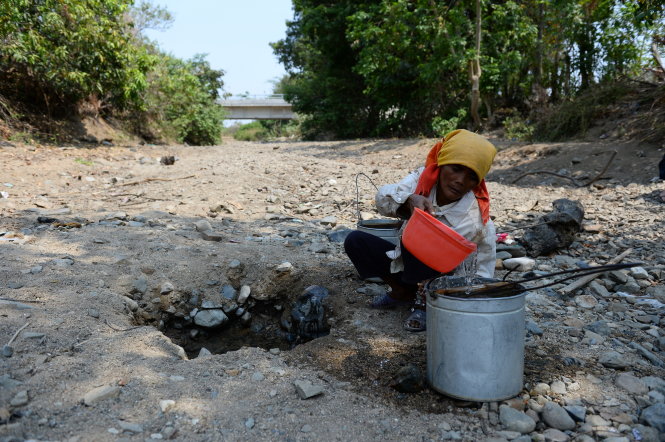Editor’s note: Victoria Kwakwa, country director of the World Bank in Vietnam, and Louise Chamberlain, country director of the United Nations Development Program in Vietnam, wrote this article exclusively for Tuoi Tre News.
Central Vietnam is facing some of the worst drought conditions in more than a decade, with water reservoirs running low, previously drought-resistant trees dying and farmers struggling to protect their crops and livestock. In its assessment of extreme weather events and disasters, the Vietnam Panel on Climate Change (VPCC) warns of increasing exposure to such harmful impacts.
This year Vietnam has a momentous opportunity to make its voice heard to shape global action on climate change while making progress at home. The Paris Climate Conference in November will bring together world leaders to negotiate a universal and legally binding agreement to reduce greenhouse gas emissions. For Vietnam, one of the countries most vulnerable to climate change, this global gathering will be a chance to show leadership on an issue that is and will continue to shape the country’s prosperity.
The good news is that Vietnam has developed policies and programs aiming to address its climate vulnerability while accelerating its transition toward a greener economy. Like other countries on the frontlines of climate change, Vietnam is also exploring how its budget system can be better support climate action.
The recent Climate Public Expenditure and Investment Review (CPEIR), commissioned by the Ministry of Planning and Investment, confirms that significant public resources are being devoted by line ministries and by provinces to manage climate risks. But more needs to be done to ensure a long-term and sustainable response to climate change at scale.
So, what more can Vietnam do to tackle its climate change challenge?
The report calls for making better use of Vietnam’s financial management system to ensure that public expenditure is directed where it is most needed and can do the most good. This means allocating funds to make people and communities more resilient to the impacts of climate change such as extreme weather events. The report also recommends investing in science and innovation to better integrate climate risks into development planning, and building capacity across all of society.
At the same time, because the impacts of climate change cut across almost every part of Vietnam’s economy, mounting a robust response will require deeper integration of climate change action into the government’s socio-economic development planning and budgeting cycle. This means harmonizing policies and prioritizing high-impact climate action in key sectors such as transportation, energy, agriculture, water, industry, and construction, and in key vulnerable regions such as the Mekong Delta.
To kick start this process the government’s response to climate change has to be at the core of the next five-year Socio-Economic Development Plan that begins in 2016.
The CPEIR report, prepared in collaboration with the World Bank and the United Nations Development Program in Vietnam, calls for new approaches to track how government spending is strengthening Vietnam’s national response to climate change. It recommends piloting a new tool, the Typology of Climate Change Response Expenditures (TCCRE), to classify and tag public expenditure in accordance with the government’s policy objectives on climate change and green growth. Because this typology can make spending on climate change more transparent, it will help government to focus resources on what works.
Periodic reporting on climate-related expenditure can also help the National Committee on Climate Change (NCCC), chaired by the Prime Minister, to fulfill its oversight role by taking stock of progress and, where needed, guiding improvements to policies and deepening coordination among ministries, national programs, and finance mechanisms. Tackling Vietnam’s climate change challenge will require action on all these fronts.
But devoting public resources to confront climate change is only part of the solution. As seen in more and more countries, reducing subsidies for fossil fuel production and putting a price on carbon can help accelerate investments in clean energy and other low-carbon measures, in turn generating economic savings and bolstering green employment.
Setting clear and unified mitigation targets to reduce its greenhouse gas emissions, and redirecting public and private finance toward renewable energy, and energy efficiency, will send clear signals about Vietnam’s commitment to build an inclusive green economy. As highlighted in the CPEIR report, efforts to attract green and climate resilient investment from domestic and international sources, including new mechanisms such as the Green Climate Fund, can be boosted by demonstrating how Vietnam’s public expenditure is making a real difference in people’s lives. Not only for the farmers in Central Vietnam, but for everyone.
While all eyes in November will be on negotiations for a global agreement to turn the tide on climate change, the CPEIR outlines how Vietnam can take action now to make its budget work for a climate secure future.
The Climate Public Expenditure and Investment Review (CPEIR) can be downloaded from www.vn.undp.org and www.worldbank.org/en/country/vietnam.
Like us on Facebook or follow us on Twitter to get the latest news about Vietnam!

























































